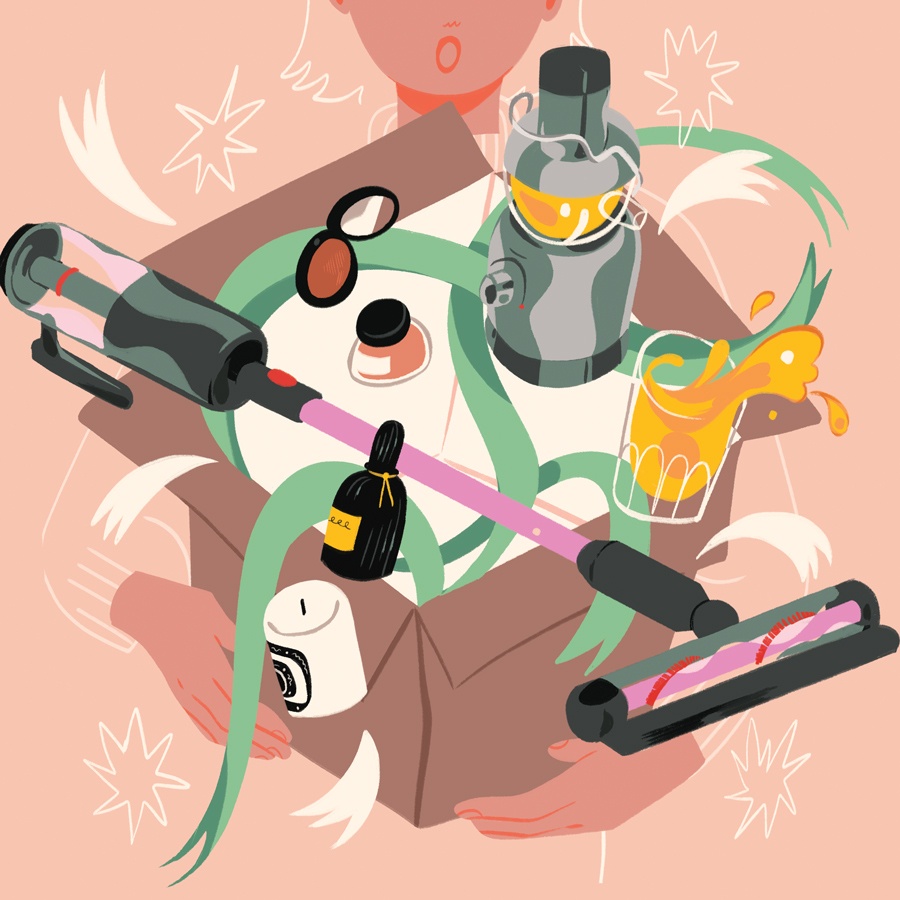Why Do We Think Buying Stuff Will Change Who We Are?
Because sometimes, just sometimes, it does.

Ah, the alluring pull of retail therapy. Illustration by Em Roberts
I am nobody’s idea of a shopaholic, but everyone has weak spots, and mine is beauty products. This will come as a surprise to those who know me, given that I wander through life as glamorous as a mud farmer, or maybe one of the fancier extras from Rocky. But therein lies the draw: What if this new cuticle oil or rose-tinted face balm changes everything? What if this one purchase finally unlocks a better (more polished, manicured) me?
I’m not alone in this particular brand of consumerist delusion: A friend of mine who has subsisted mainly on Triscuits for the decade I’ve known her regularly buys things like juicers and vegan-whole-food cookbooks, tools for her eventual transformation into a health goddess. Another friend at home with two tiny children admits that she can’t stop buying chic, structured clothes to lure her out of activewear and back into fashion, to no avail (as yet).
After decades on this earth and untold numbers of similarly aspirational purchases, you’d think we’d know better. But here’s the truth: Sometimes, shopping really does transform you on an elemental level. I know this because when our dustbuster died, I replaced it with a cordless vacuum and then promptly became an entirely different person: someone who vacuums every day. And since cleaning begets cleaning, this purchase basically amounted to a whole-house upgrade. A life upgrade, really. More than a year in, my husband and I still regularly marvel at the filthy dust-dwellers we were before this vacuum came along and changed everything.
For acquaintances I’ve polled on this topic, life-changing purchases have included a pair of sneakers that led to a personal tennis renaissance, an electric toothbrush, a lime squeezer, erasable pens, a rotary-blade push mower, drugstore readers, and so many air fryers. Some buys, like Pelotons and new breasts, are transformational by design, but by and large, there’s really no telling what purchase might be the gateway to a new you. It probably won’t be cuticle oil. But there’s always the hope, and that’s what keeps me at it.
Science would suggest that some of this pull is actually biological: Even just browsing things you might want to buy lights the brain’s so-called “pleasure center” like a pinball machine. It’s no wonder, then, that so many people went on buying sprees during the dreary, dread-filled slog of COVID isolation. Though I also think, given how much time alone we had for self-reflection, folks weren’t only looking for that quick joy fix, that antidote to boredom. They were searching out those magic buys that might make them someone better: bread pans to — poof! — make them bakers; planners to make them organized; a guitar to make them Bruce Springsteen.
As I’ve gotten older, I’ve leaned increasingly towards minimalism. If I’m buying something, I hope it’s at least as transformative as some erasable pens. Alas, as experience (and anyone who bought a bunch of bread pans during COVID) will tell you, shopping doesn’t always work out that way. That rose-tinted face balm, for instance? It wasn’t magic; it was just blush. And that’s fine. I’ll use it. But it won’t change my life.
Maybe next time.
Published as “Add to Cart, Change Your Life?” in the October 2021 issue of Philadelphia magazine.


